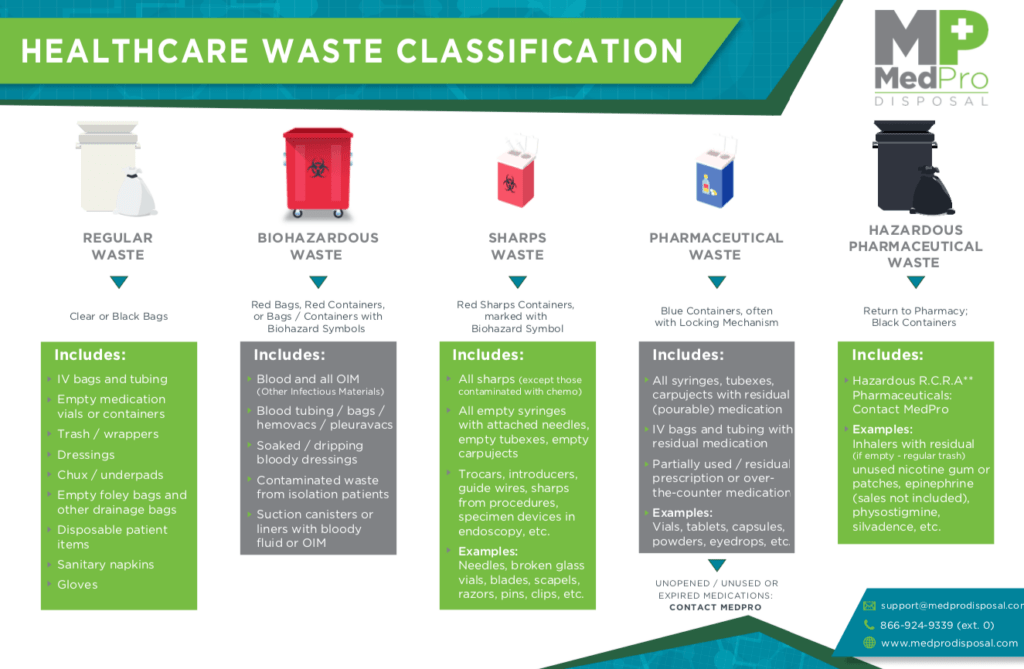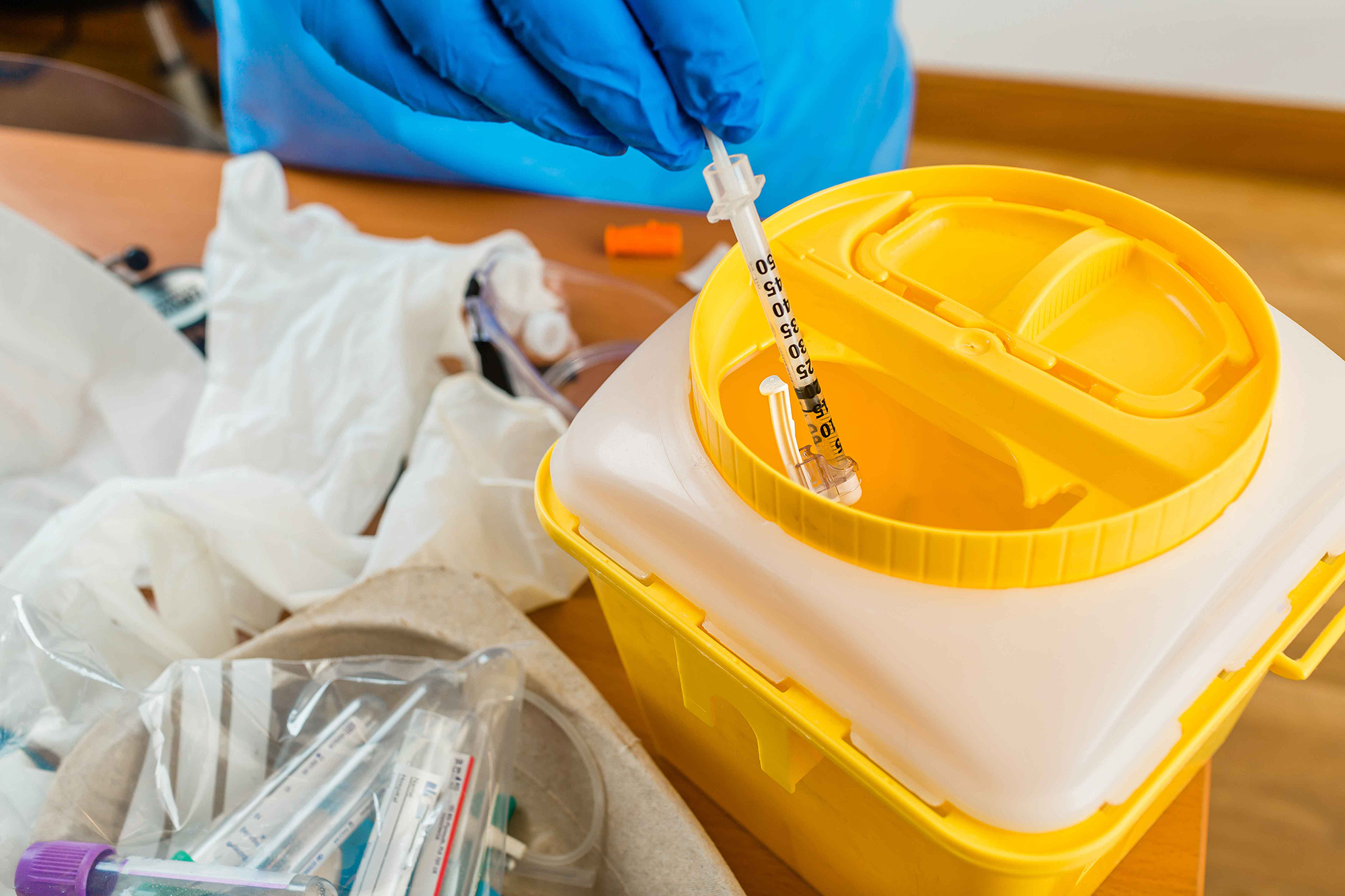Turnkey Medical Waste Removal Service: Smooth Disposal for Medical Care Facilities
Wiki Article
Guaranteeing Safe Handling and Disposal of Medical Waste
Ensuring safe handling and disposal of clinical waste is of critical relevance in healthcare settings. Incorrect management of medical waste can pose significant dangers to the setting, public health, and healthcare employees. This demands adherence to stringent guidelines and methods for its secure handling and disposal. In this intro, we will check out the significance of proper medical waste administration, the dangers connected with incorrect handling and disposal, in addition to the standards and strategies that can be carried out to guarantee its secure disposal. In addition, we will certainly go over the value of training and education for medical care specialists in order to preserve a risk-free and tidy health care atmosphere. By complying with these practices, we can successfully alleviate the potential hazards associated with medical waste.Significance of Proper Clinical Waste Administration
Proper medical waste management is of utmost relevance in making certain the security and well-being of healthcare specialists, people, and the basic public. Clinical waste refers to any type of waste generated by medical care centers during the diagnosis, therapy, or immunization of human beings or animals. This waste can posture severe health and wellness dangers otherwise handled and taken care of effectively.
One of the key reasons proper clinical waste administration is critical is to stop the spread of contagious illness. Medical waste, such as utilized needles, polluted dressings, and biological products, can bring hazardous microorganisms. If not managed and dealt with properly, these microorganisms can be sent to medical care workers, people, waste trainers, and also the general public, causing the prospective break out of diseases.
In addition, proper clinical waste administration assists safeguard the environment - medical waste disposal. Medical waste includes harmful materials, consisting of chemicals, drugs, and contaminated materials. When not taken care of suitably, these substances can contaminate soil, water bodies, and the air, positioning a substantial threat to communities and public health and wellness
In addition, effective medical waste management makes sure conformity with regional laws and global requirements. Governments and regulatory bodies have actually developed procedures and standards to make certain the secure handling, storage space, transportation, and disposal of clinical waste. Complying with these guidelines is important to stay clear of lawful effects and preserve the online reputation and reliability of health care centers.
Threats of Improper Handling and Disposal

If medical waste is not properly disposed of,Clients can likewise be subjected to these contagious illness. If polluted needles or other sharps are not disposed of in assigned puncture-proof containers, they may unintentionally prick clients, leading to potential infections. Additionally, if clinical waste is not set apart properly, there is a risk of cross-contamination in between different sorts of waste, more increasing the opportunities of illness transmission.
Improper disposal of clinical waste can additionally have harmful effects on the environment and the public. If clinical waste is not treated and thrown away properly, it can contaminate water resources, soil, and air, resulting in the spread of conditions and contaminants. This can have long-lasting consequences on ecosystems and public wellness.
Guidelines for Safe Handling of Medical Waste
Applying efficient procedures for the secure handling of medical waste is vital in ensuring the defense of healthcare specialists, individuals, and the public. These standards are vital in minimizing the dangers linked with the handling and disposal of medical waste, such as infections, injuries, and ecological contamination.Primarily, healthcare centers must establish a comprehensive waste monitoring strategy that sticks to neighborhood, national, and worldwide regulations. This strategy needs to include clear directions on waste partition, packaging, transport, labeling, and storage space. It is important to divide various kinds of waste, such as sharps, contagious products, pharmaceuticals, and non-hazardous waste, to stop cross-contamination and advertise safe disposal.
In addition, medical care employees must get extensive training on appropriate waste handling methods. They must be enlightened on the prospective dangers of clinical waste, the suitable use personal protective devices (PPE), and the proper treatments for dealing with, transporting, and disposing of different types of waste.
Additionally, health care centers need to frequently keep an eye on and examine their waste monitoring techniques to make certain conformity with standards. This consists of carrying out normal inspections, evaluating waste handling treatments, and providing comments and training to team members.
Efficient Methods for Garbage Disposal
To ensure the safe handling and disposal of medical waste, it is necessary to utilize effective techniques for waste disposal. Clinical waste can posture significant risks to public wellness and the environment if not taken care of and gotten rid of effectively. For that reason, medical care facilities and waste administration companies should apply suitable approaches to mitigate these risks.It involves dividing various types of clinical waste based on their qualities. Healthcare facilities must supply clear guidelines and training to team members on just how to set apart waste appropriately.

Furthermore, healthcare centers must work together with qualified waste administration firms to guarantee appropriate disposal of medical waste. These business have the expertise and equipment required to securely handle and dispose of clinical waste in conformity with laws and finest techniques.
Training and Education And Learning for Health Care Professionals
Health care experts play a vital function in making certain the secure handling and disposal of clinical waste via detailed training and education and learning. It is crucial for healthcare suppliers to have a deep understanding of the potential risks linked with clinical waste and the correct methods for its management. By obtaining proper training, healthcare specialists can lessen the possible transmission of infectious conditions, protect against environmental contamination, and shield both themselves and the general public.
Moreover, training programs must stress the usage of personal protective tools (PPE) and correct hand hygiene techniques when handling medical waste. medical waste removal service. Healthcare experts need to recognize exactly how to correctly get rid of and use of PPE to safeguard themselves from prospective direct exposure to unsafe materials. They ought to likewise be informed on the significance of routine handwashing and the appropriate use hand sanitizers to reduce the spread of contagious conditions
Continuing education and normal updates on medical waste administration techniques are critical for medical care experts. As guidelines and policies develop, it is vital to keep health care suppliers notified about any changes in procedures and finest techniques. This will certainly make sure that they remain updated and maintain a high criterion of security in handling and getting rid of of clinical waste.
Verdict
In conclusion, correct handling and disposal of clinical waste is vital to guarantee the security of healthcare specialists, individuals, and the environment. Disregarding to adhere to guidelines and guidelines can cause different threats and risks. Applying efficient strategies for garbage disposal and providing proper training and education for medical care professionals are important in preserving a safe medical care setting. By adhering to these practices, we can minimize the possible dangers connected with medical waste.Medical waste refers to any kind of waste produced by health care facilities throughout the diagnosis, therapy, or immunization of human beings or pets. If clinical waste is not segregated correctly, there is a danger of cross-contamination between different types of waste, more raising the chances of disease transmission.
It is important to divide different kinds of waste, such as sharps, contagious products, drugs, and non-hazardous waste, to prevent cross-contamination and promote risk-free disposal. WasteX Medical Waste Disposal.
To guarantee the risk-free handling and disposal of clinical waste, it is important to utilize reliable techniques for waste disposal. Additionally, health care centers should establish a normal waste collection and transport routine to protect against waste build-up and reduce the risk of mishaps or contamination.
Report this wiki page